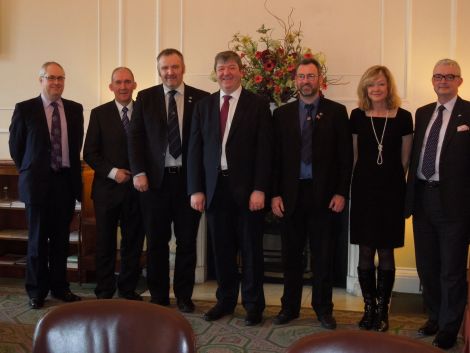News / ‘Fruitful’ talks on further powers for islands
SHETLAND ISLANDS Council leader Gary Robinson says islands politicians are making a strong case to secure more power over renewable energy and revenue from the Crown Estate – as well as greater representation at EU level.
Robinson, along with local authority chief executive Mark Boden, is in London this week for three days of meetings with UK Government cabinet ministers and senior officials.
It is part of the Our Islands Our Future (OIOF) campaign striving for greater autonomy in Scotland’s three island groups: Shetland, Orkney and the Western Isles.
Meanwhile both Robinson and Northern Isles MP Alistair Carmichael said that they have detected little demand for outright independence – contrary to much recent national media coverage.
Monday saw more discussions with energy and climate change minister Ed Davey aimed at removing constraints on renewables projects in the islands. Shetland’s local energy grid is unable to absorb any more power generated from renewable sources.
The politicians are calling for obstacles such as the lack of an interconnector cable to the National Grid to be removed.
“We’ve taken innovation to new extremes in terms of finding ways to get electricity,” Robinson said, “for example, the tidal turbine through the North Yell Development Council is being used in the first instance to power an ice plant purely because of the constraints.”
He conceded there were differences of opinion between Liberal Democrat minister Davey and some of his Tory colleagues in the coalition government on renewables.
But Davey has “been doing everything he can to remove the blockages”, and Robinson hopes the creation of a delivery forum bringing together government, local authorities and power companies will “actually make things happen”.
Tuesday will see talks with minister for cities Greg Clark. While that might seem like an odd portfolio for the island councils to target, Robinson explained some cities in England enjoy a “special arrangement” with government which they hope to learn from.
Become a member of Shetland News
“A city council is quite obviously different from a rural council, but we’re making an argument that an islands council is substantially different from a mainland council, never mind a city council.”
Europe minister David Lidington also features on the list of appointments. The three councils are seeking “better and more direct representation” in Brussels, and Robinson said he envisaged something similar to the permanent representation afforded to the Isle of Man and Cornwall.
It is partly about ensuring a greater say over agriculture and fisheries. The politicians also want to see the “de minimis” level up to which councils can support private businesses raised from the current cap of 200,000 Euros.
“We certainly believe we could have much more state intervention in places without affecting competition in the wider country, or indeed the EU,” Robinson said.
The three island leaders will give evidence to Westminster’s Scottish affairs select committee on Tuesday afternoon.
Carmichael, who is also Scottish secretary of state, said the islands were gaining access to the inner workings of government that “we would only have dreamed of in the past”.
He feels discussions to date have been “fruitful and productive” and is now eager to see something put down on paper.
“I’m keen to get the first draft of any sort of concordat or agreement on the table as soon as possible so that we can take advantage of the political window of opportunity that exists,” Carmichael said.
Meanwhile, Robinson and Carmichael said they felt there was no great appetite for Shetland to become independent.
A separate campaign, under the name Referenda on the Islands (ROTI), is calling on the Scottish Parliament to stage independence referendums in each of the three island groups a week after the 18 September poll on Scottish independence.
So far just over 1,000 people have signed the petition, but it is unclear how many are native islanders.
Robinson said the ROTI group had made no contact with the SIC.
“I think it needs to be thought through in much more detail,” he said. “Even just where our ferries and our transport links go; what currency would we spend when we got there?
“Our health board has ties currently with Grampian Health Board, Aberdeen Royal Infirmary – would that still be the case? Would our ferry go to North Berwick, would our hospital care be Leeds General?”
He said a week was much too short a period of time to examine such matters, adding: “Personally I’ve not detected much in the way of support for it.”
Carmichael said there were already two major pieces of constitutional upheaval – the Scottish independence referendum and the OIOF campaign – underway.
“I’m not keen to embark on something else at the moment that is going to be a distraction from these two very important pieces of work.”
He added: “I don’t detect a great deal of appetite for full-blown independence. If you look to our nearest neighbour, the Faroe Islands, which has a much greater degree of autonomy [because they are] much further away from Denmark than we are from the UK, even they have never gone that far.”
It is expected the concordat with the UK government will be published in May.
A prospectus outlining autonomy on matters devolved to Holyrood will be published by the end of June.
Robinson said talks with community councils in Shetland were held at the weekend, while a public meeting is pencilled in for the end of April.
Become a member of Shetland News
Shetland News is asking its many readers to consider paying for membership to get additional features and services: -
- Remove non-local ads;
- Bookmark posts to read later;
- Exclusive curated weekly newsletter;
- Hide membership messages;
- Comments open for discussion.
If you appreciate what we do and feel strongly about impartial local journalism, then please become a member of Shetland News by either making a single payment, or setting up a monthly, quarterly or yearly subscription.




























































